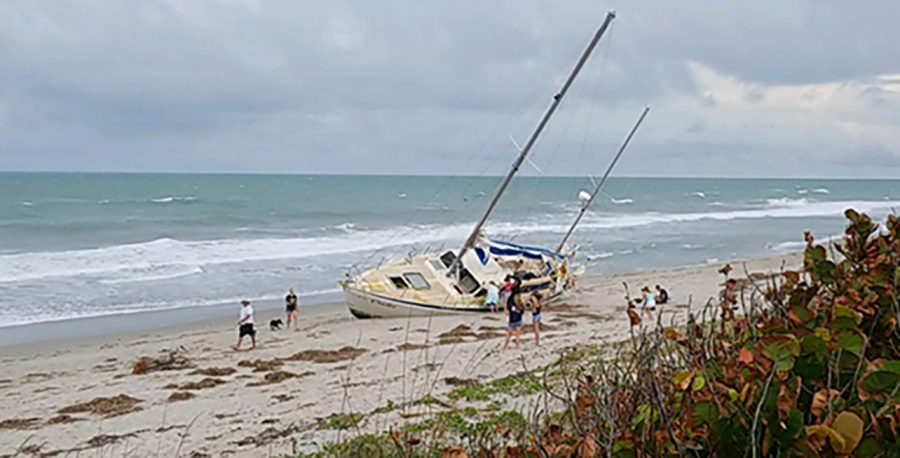Spinning out of control
The damaging effects of climate change
After Hurricane Irma passed over Florida, this abandoned ship full of mannequins, named Cuki, washed ashore on Melbourne Beach. It is believed it came from the Florida Keys and made its way up the east coast.
 Avery Munson
Avery Munson
The Earth is dying. It’s our fault, kind of. Unless you have been living under a rock your entire life, you have probably heard of global warming and climate change. Global warming is the gradual temperature rise on Earth, and climate change is the overall term for all the changes that are happening around our planet. This year has shown us devastating wildfires that engulfed much of the northwest, including California and Montana, and unusually strong hurricanes that gain their strength in the Atlantic Ocean before wreaking absolute havoc on the United States.
You’re probably thinking, “Okay, cool, but we live in Nebraska.” Yeah, you’re right, but the effects of climate change are slowly creeping towards us, and most of us don’t even realize it. Most of us were born right at the turn of the century, and all we have ever known is climate change, believe it or not. The Earth’s temperature just keeps rising. The past 16 years have been the warmest on record globally. In fact, 2016 was the warmest year since 1884, according to NASA.
You don’t have to listen to me, though. Take it from meteorologist Chris Buttler. Buttler has studied weather and climate for 19 years. “I’m a believer in climate change. The debate, however, lies within whether it’s a natural cycle or human induced, and how do we mitigate that?” Buttler said. The problem is that many economies thrive on industry which tends to involve burning fossil fuels. Scientists measure the amount of carbon dioxide in the air every year, and the level has steadily increased in the past few decades. Man has played a role in the rising carbon dioxide levels. Why should you care about this? Carbon dioxide gets trapped on Earth because it is heavier than air and can’t escape into space, so it remains in the atmosphere and acts as a blanket, trapping the Earth’s heat. That’s the local effect, but for the people across our nation, it’s a bit of a bigger issue.
Remember those hurricanes I mentioned earlier? Though the storms were not directly caused by climate change, most scientists agree that they were a lot stronger than normal, because the ocean is warmer. The warmer ocean water gave the storms more strength, which made its effects far more devastating upon landfall. On top of that, freshwater ice caps are melting slowly but surely, raising the sea level. When you combine the strong hurricanes with the rising sea level, it’s a cause for concern, especially when you consider that most people don’t live in the middle of our country, but along the coasts.
Personally, I believe in climate change. I mean, how could I not? I trust the people over at NASA. But, even if NASA didn’t have so much proof on their website, I would still believe in it. You can tell the Earth is changing without the opinion of a scientist. How? Well, our winters don’t seem to be quite as cold as they once were, and our summers seem to get hotter every year. Many people, including students at NPHS, believe in climate change, but they don’t think it’s as bad as it’s made out to be. Buttler disagrees. He thinks it’s going to take a lot of big events to get people thinking again. “Typically, the United States is a reactionary country. We wait until something happens and then we overkill it,” he said.
Climate change has been happening forever. It’s a part of the Earth’s life cycle. It’s the reason we’ve had multiple ice ages. And, even though humans have amplified its effects in recent times, Buttler does not believe it is too late to fix the damage we’ve caused. I don’t think it’s too late either. I think that we are the generation of change, and if we want to leave behind a habitable planet for our children and their children, then we need to act sooner rather than later.

Class of 2019.
2x State Journalism qualifier and letter winner.
3x State Tennis Qualifier.
3x varsity Track (3200m, 1600m) 2x letter winner
...


